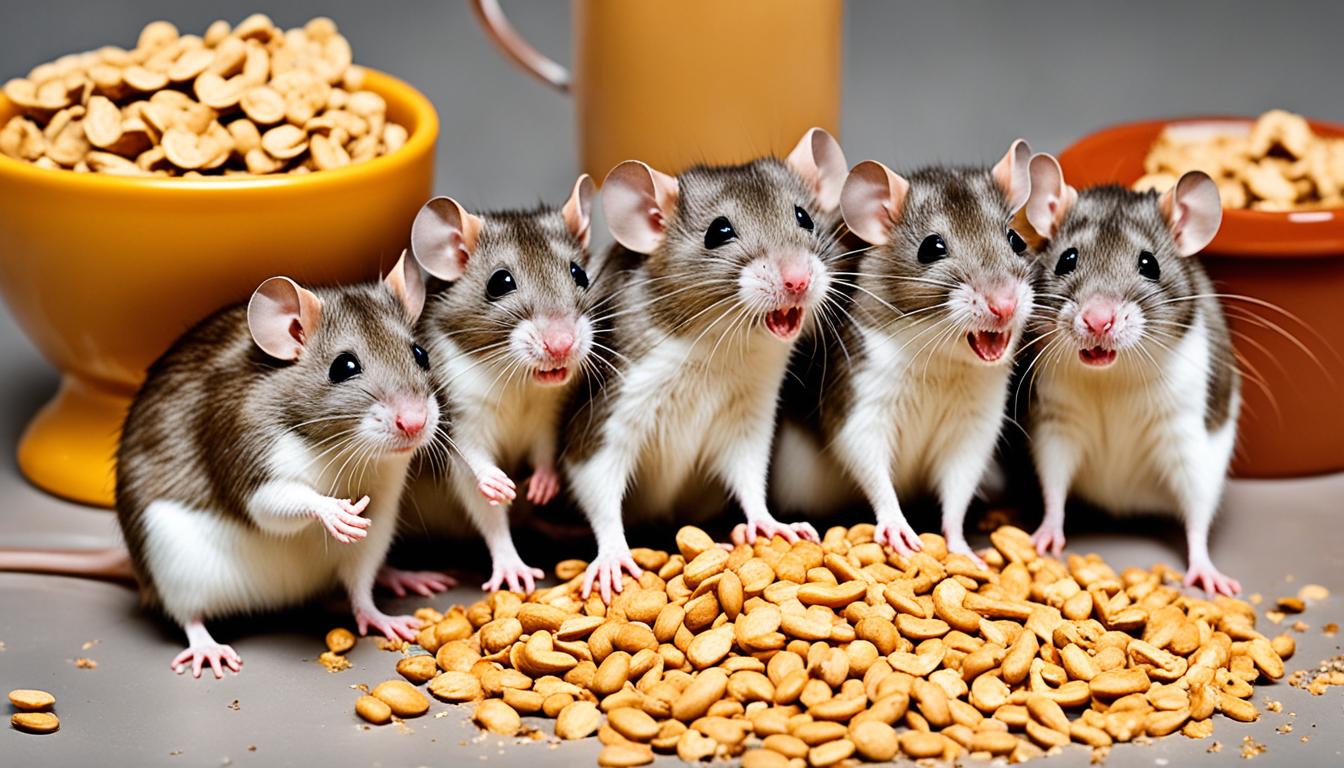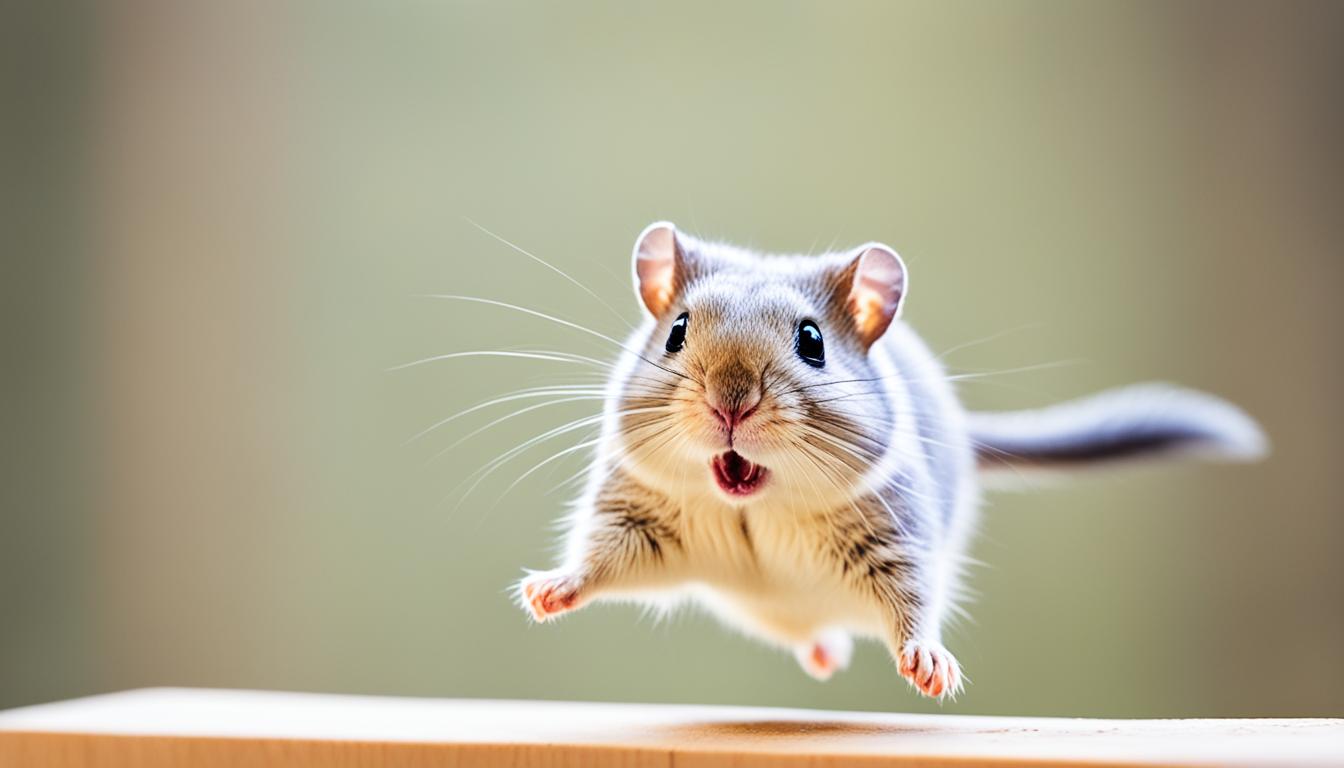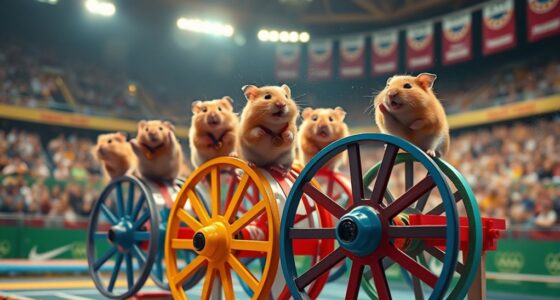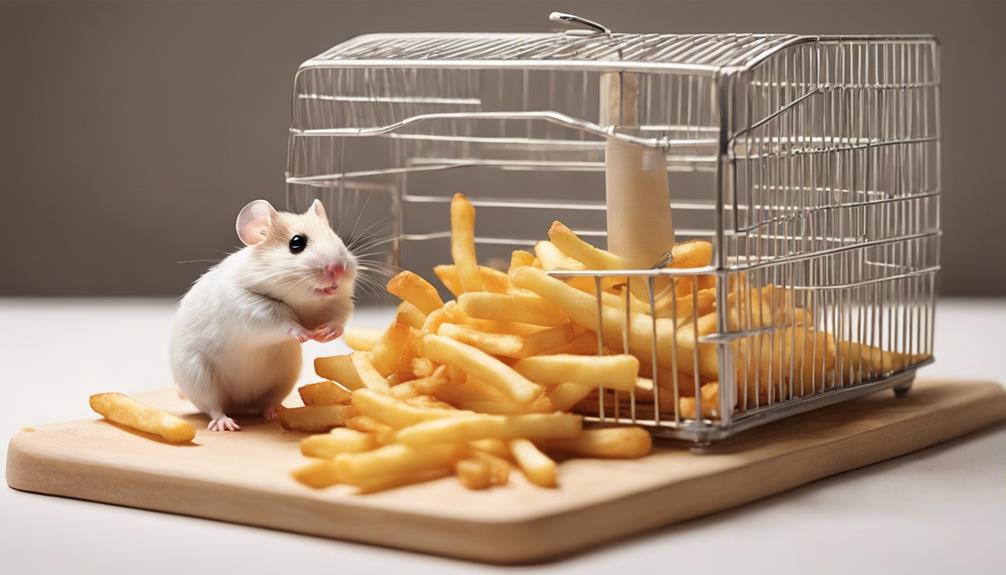Did you realize that rats can actually eat peanut butter without any harm? It’s true! These small, furry animals can indulge in the tastiness of peanut butter, but there are essential precautions to take to guarantee their well-being. This article will delve into the dos and don’ts of giving rats peanut butter, along with sharing valuable advice to ensure your rat’s treats are both safe and enjoyable.
Key Takeaways:
- Rats can safely consume peanut butter in small quantities but avoid giving them a chunk of peanut butter as it can pose a choking hazard. Consider spreading a thin layer on a small piece of bread or letting them lick a small amount thinly smeared on your finger.
- Avoid feeding pet rats foods that are toxic or harmful, such as avocado skin and pit, chocolate, citrus fruits, raw beans or sweet potatoes, and foods with d-limonene.
- Unhealthy foods like high-fat and sugary options should be limited in a rat’s diet to prevent weight gain and associated health problems.
- Some foods can pose physical risks to rats, such as hard foods like raw pasta or large uncooked vegetables, sticky foods like peanut butter, and pits or seeds from fruits like cherries or apricots.
- Ensure a balanced diet for rats by offering fresh fruits, vegetables, lean protein sources, whole grains, and small amounts of dairy products. Commercially available rat blocks and treats can also supplement their nutritional needs.
Foods to Avoid Feeding Pet Rats
While rats can enjoy a wide variety of foods, there are certain items that should be avoided. These include:
- Avocado skin and pit
- Chocolate
- Citrus fruits
- Mango
- Green potatoes
- Licorice
- Raw beans or sweet potatoes
- Foods with d-limonene
These foods can be toxic or harmful to rats and should be strictly avoided to ensure their well-being.
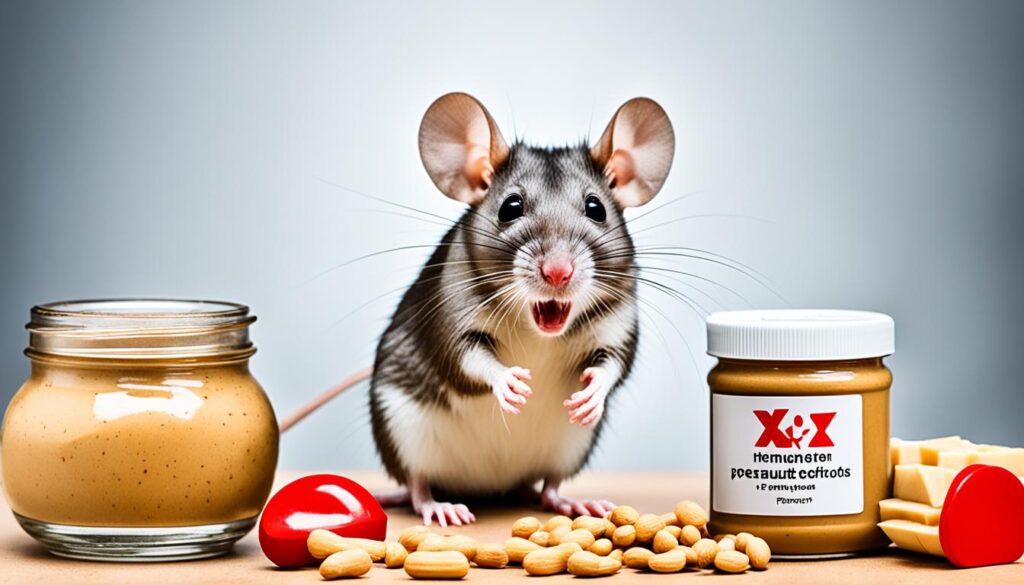
Unhealthy Foods for Rats
When it comes to maintaining the health and well-being of our pet rats, it’s essential to be mindful of their diet. While rats are known to have a versatile palate, there are certain foods that can be unhealthy for them if consumed in excess.
One category of unhealthy foods for rats includes high-fat foods. Rats are prone to weight gain and obesity, so it’s crucial to avoid feeding them foods that are high in fat content. This includes processed foods and fried food, which can contribute to weight gain and various health problems.
Additionally, sugary foods should be limited in a rat’s diet. Excessive consumption of sugary foods can lead to weight gain, diabetes, and heart issues. While small amounts of natural sugars found in fruits can be enjoyed by rats, it’s important to avoid giving them foods with added sugars or sweeteners.
To provide further clarity, here is a breakdown of unhealthy foods to avoid feeding your pet rats:
- Processed foods
- Fried food
- Excessive amounts of nuts
- Foods high in sugar content
Remember, it’s all about moderation. Providing a balanced and nutritious diet is key to keeping your rats healthy and happy!
Maintaining a healthy diet for your pet rats helps prevent obesity and promotes overall well-being. Instead of unhealthy snacks, opt for rat-safe alternatives such as fresh fruits, vegetables, lean proteins, and specially formulated rat blocks and treats. It’s important to consult with a veterinarian knowledgeable about rat nutrition for personalized guidance on maintaining a healthy diet for your furry friends.
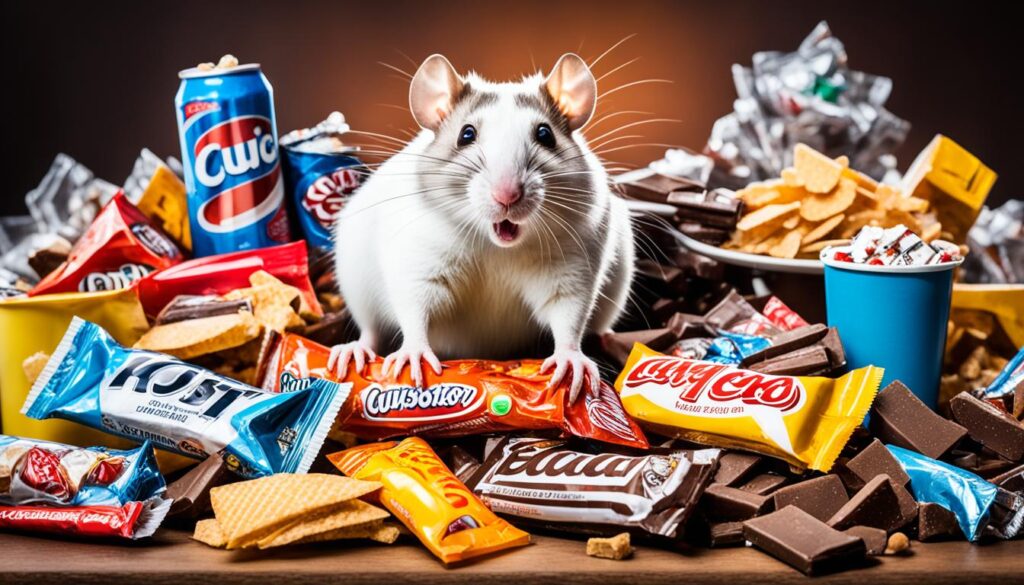
Rats Snacking Responsibly
While it’s tempting to spoil our furry companions with snacks, it’s important to prioritize their health and offer treats in moderation. Here are a few tips for responsible snacking:
- Stick to healthy options: Focus on providing fresh fruits and vegetables as well as specially formulated rat blocks and treats.
- Control portion sizes: Avoid overfeeding and offer snacks in appropriate quantities based on your rat’s size and dietary needs.
- Diversify their snack selection: Introduce a variety of healthy treats and rotate them to offer a well-rounded diet.
By being mindful of the unhealthy foods to avoid and making informed choices about your rat’s diet, you can help them live a long, healthy, and happy life.
Foods That Can Pose Physical Risks to Rats
When it comes to feeding our furry friends, it’s important to be mindful of the physical risks certain foods can pose to rats. These risks can stem from factors such as size, texture, and difficulty in chewing and swallowing. By being aware of these potential hazards, we can ensure the safety and well-being of our pet rats.

Beware of Choking Hazards
Some foods may present a choking hazard to rats due to their hardness or size. Examples of these risky foods include raw pasta and large, uncooked vegetables. These items can be challenging for rats to chew and swallow properly, increasing the likelihood of obstruction in their throat. To prevent choking hazards, it’s important to avoid feeding rats large, chunky food items.
Sticky Situations
Sticky foods, like peanut butter, can also pose physical risks to rats. While a small amount of peanut butter can be enjoyed by rats, large quantities or clumps of sticky peanut butter can get stuck in their throat. This can lead to difficulty breathing and, in severe cases, even suffocation. To keep our furry friends safe, it’s best to provide peanut butter in small, thinly spread amounts to minimize the risk of choking.
Watch Out for Pits and Seeds
Pits or seeds from certain fruits, such as cherries or apricots, also present physical risks to rats. These pits can be a choking hazard if accidentally swallowed whole. Additionally, some pits and seeds contain toxic substances that can be harmful to rats if ingested. To keep our rats safe, it’s important to remove pits and seeds from fruits before offering them as a snack.
Physical Risks to Rats: Summary
Being aware of the physical risks certain foods pose to rats is crucial for their safety and well-being. By avoiding choking hazards, providing sticky foods in moderation, and removing pits and seeds, we can help ensure that our furry friends enjoy a safe and enjoyable dining experience.
| Physical Risk | Examples | Precautions |
|---|---|---|
| Choking hazards | Raw pasta, large uncooked vegetables | Avoid feeding rats large, chunky food items |
| Sticky foods | Peanut butter | Provide small, thinly spread amounts of peanut butter |
| Pits and seeds | Cherry pits, apricot seeds | Remove pits and seeds from fruits |
Rat-Safe Alternatives for a Balanced Diet
To ensure a balanced and nutritious diet for our pet rats, we recommend offering a variety of rat-safe alternatives. These alternatives include:
- Fresh Fruits and Vegetables: Incorporating fresh fruits and vegetables into your rat’s diet provides essential vitamins, minerals, and fiber. Some rat-friendly options include apples, bananas, pears, citrus fruits, cabbage, broccoli, berries, peas, carrots, and melons.
- Lean Protein Sources: Rats require protein for healthy growth and development. Consider offering lean protein sources such as cooked chicken, eggs, or tofu in small quantities to meet their dietary needs.
- Whole Grains: Whole grains like brown rice, quinoa, and oats can provide rats with energy and fiber. These grains can be cooked and offered to your rats as part of a balanced diet.
- Small Amounts of Dairy Products: While rats are lactose intolerant and should not consume dairy in large quantities, small amounts of yogurt or cheese can be given occasionally as a treat.
Commercially available rat blocks and treats can also be incorporated to provide additional nutrition and variety.
One popular brand of rat blocks is Exotic Nutrition Rodent Blocks, which are specifically designed to meet the nutritional needs of rats. These blocks contain a balanced blend of essential nutrients to promote overall health and well-being. Alongside rat blocks, treats like Dandelion Delicacy and Garden Fresh Re-Hydrate can be given in moderation to add variety and provide additional nutritional benefits.
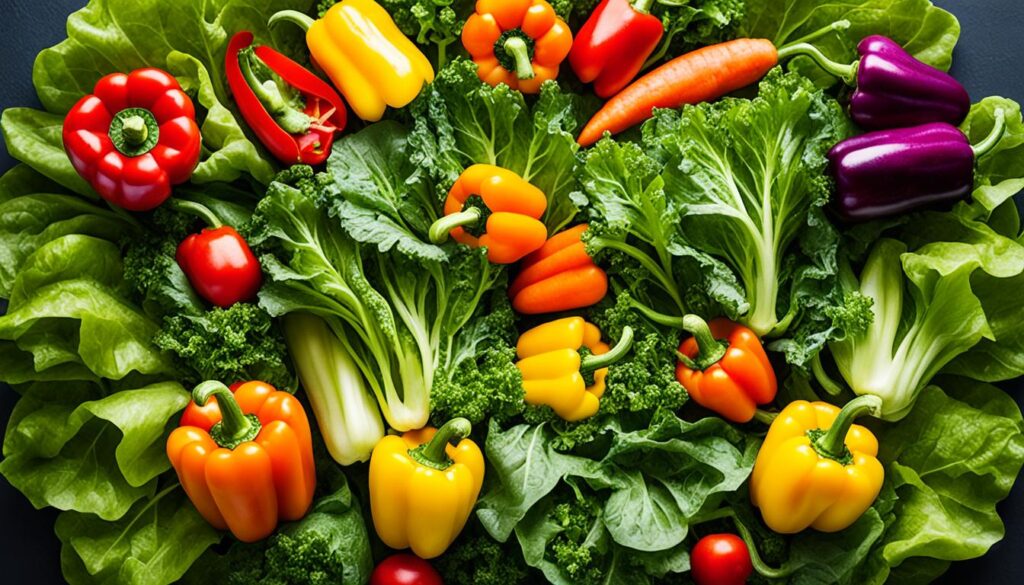
By feeding our rats a balanced diet that includes these rat-safe alternatives, we can ensure that they receive the essential nutrients they need for a healthy and fulfilling life.
Best Fruits and Vegetables for Rats
Rats can enjoy a variety of fruits and vegetables as part of their diet. Including these fresh options provides essential vitamins, minerals, and fiber that contribute to a healthy rat diet.
- Apples: A crunchy and nutritious fruit that’s safe for rats to enjoy. Remember to remove the seeds as they can be harmful.
- Bananas: A tasty and easily digestible fruit that rats love. It’s a good source of potassium and is gentle on their digestive system.
- Pears: Another sweet and juicy fruit that’s safe for rats. Pears are high in fiber and contain essential nutrients like vitamin C.
- Citrus Fruits: Oranges, lemons, and grapefruits can be given in small amounts. These fruits are a great source of vitamin C but should be given sparingly due to their acidic nature.
- Cabbage: Rats can enjoy both red and green cabbage. It’s a cruciferous vegetable packed with fiber and nutrients that support overall health.
- Broccoli: A highly nutritious vegetable that rats can eat raw or cooked. It’s rich in vitamins, minerals, and antioxidants.
- Berries: Blueberries, raspberries, and strawberries make delicious and healthy treats for rats. They are low in sugar and rich in vitamins and antioxidants.
- Peas: Fresh or frozen, peas provide rats with protein, fiber, and various vitamins. They can be served raw or lightly steamed.
- Carrots: A crunchy and nutritious root vegetable loved by rats. Carrots are a great source of beta-carotene, vitamin K, and fiber.
- Melons: Watermelon, cantaloupe, and honeydew are refreshing and hydrating fruits that rats can enjoy. They are low in calories and packed with vitamins.
To ensure a balanced diet, it’s important to offer a variety of these fruits and vegetables to rats. Remember to wash produce thoroughly, remove any seeds or pits, and introduce new foods gradually to prevent digestive upset.
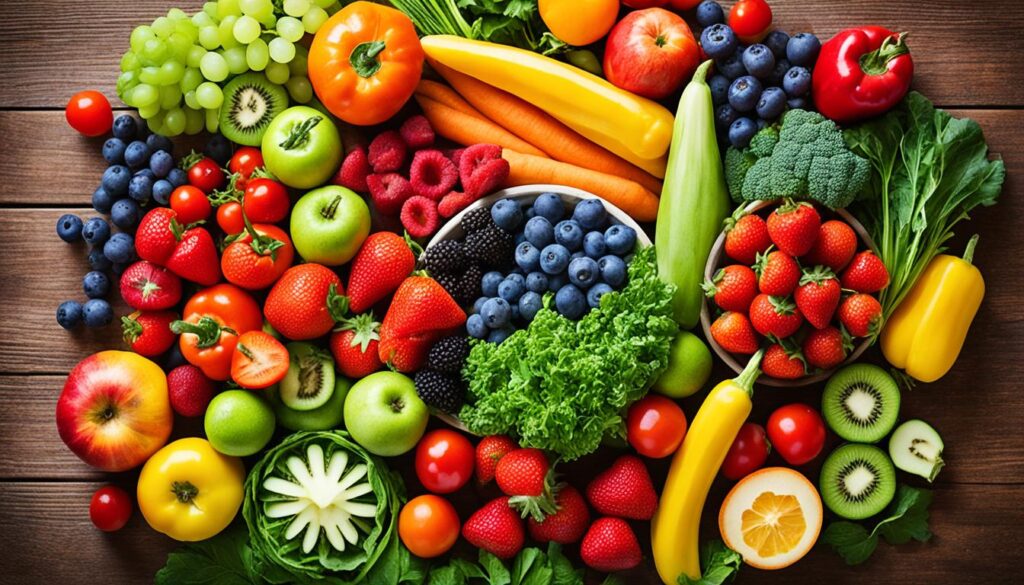
Rat Treats and Training Rewards
Rats are highly intelligent and can be motivated by treats, making them ideal for training. By using food rewards, you can teach your rats tricks and tasks while strengthening the bond between you and your furry friends. When selecting treats for your rats, it’s important to choose options that are safe and appropriate for their diet.
Suitable Treats for Rats
There are a variety of treats that rats enjoy and can be used as rewards during training sessions. Some suitable options include:
- Seeds: Rats love seeds like sunflower seeds or pumpkin seeds, which they can nibble on as a small reward.
- Sweets: Small pieces of unsweetened cereal or dried fruit can be given as a sweet treat.
- Bread: Tiny bits of bread can be used as a reward and can be easily held in their paws.
- Cooked pasta and rice: These cooked grains are enjoyed by rats and can be used as training rewards.
- Cereal and grains: Rats enjoy crunchy cereals or small amounts of cooked grains like quinoa or millet.
- Mealworms: These high-protein treats can be given in small quantities to supplement their diet.
Remember, treats should be given sparingly due to their high carbohydrate or sugar content. It’s important to maintain a balanced diet for your rats and not rely solely on treats.
“Using treats during training sessions not only provides motivation for your rats, but it also helps stimulate their intellect and problem-solving abilities.” – Dr. Olivia Brown, Animal Behaviorist
To make training more effective, use treats that your rats find irresistible. Find what motivates them the most and use it as a reward during training sessions. This will help keep them engaged and eager to learn.
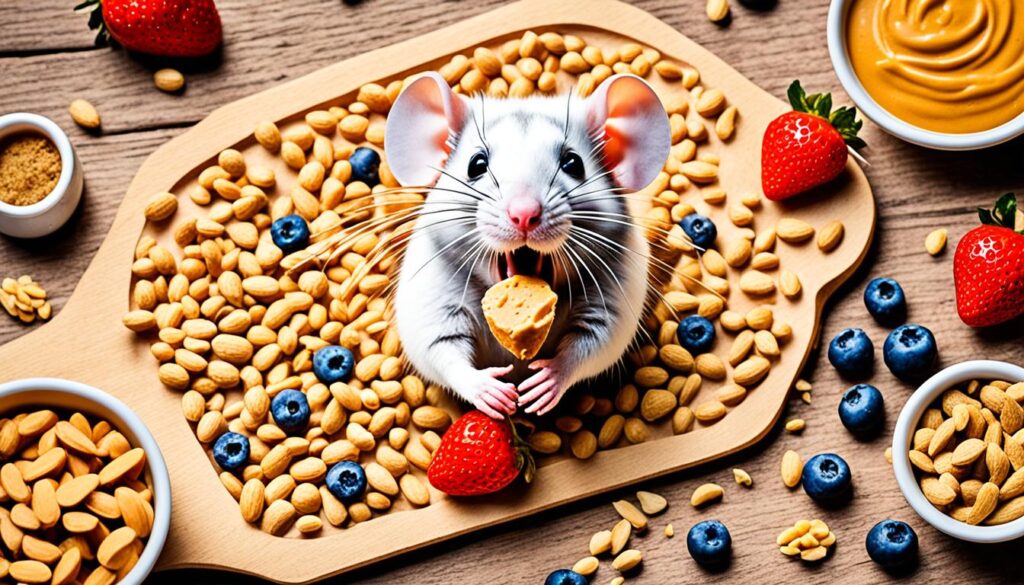
Training your rats can be a rewarding experience for both you and your pets. Through positive reinforcement and the use of appropriate treats, you can teach them a wide range of behaviors and tricks. Just remember to keep the training sessions short, engaging, and fun for your furry companions.
Dangerous and Poisonous Foods for Rats
When it comes to the well-being of our furry friends, it’s crucial to be aware of the foods that can be dangerous or even poisonous to rats. As responsible rat owners, we should steer clear of certain foods to safeguard their health and happiness.
Here are some examples of foods that should never be given to rats:
- Chocolate: Although it’s a favorite treat for humans, chocolate is toxic to rats. Theobromine, a compound found in chocolate, can cause cardiac malfunction and even be fatal.
- Caffeine: Rats are highly sensitive to caffeine, found in coffee, tea, energy drinks, and certain flavored foods. Ingesting caffeine can lead to elevated heart rate, restlessness, and even seizures.
- Foods with d-limonene: D-limonene is commonly found in citrus fruits and is harmful to rats. Regular consumption of foods containing d-limonene can lead to liver toxicity.
- Raw beans or sweet potatoes: Raw beans and sweet potatoes contain lectins, which can cause digestive upset and negatively affect the overall health of rats.
- Potatoes with green skin: Rats should avoid potatoes with green skin, as they contain a toxin called solanine. Ingesting solanine can cause gastrointestinal distress and even respiratory issues in rats.
- Sticky foods like peanut butter: While rats can safely consume peanut butter in small quantities when appropriately introduced, sticky foods like peanut butter can pose a choking hazard if given in large amounts or without caution.
- Wild insects: While some insects can be a natural part of a rat’s diet, it’s vital to avoid feeding them wild insects. Wild insects may carry harmful bacteria or pesticides that can be detrimental to a rat’s health.
By avoiding these dangerous and potentially poisonous foods, we can protect our beloved rats from harm and ensure they lead happy and healthy lives.
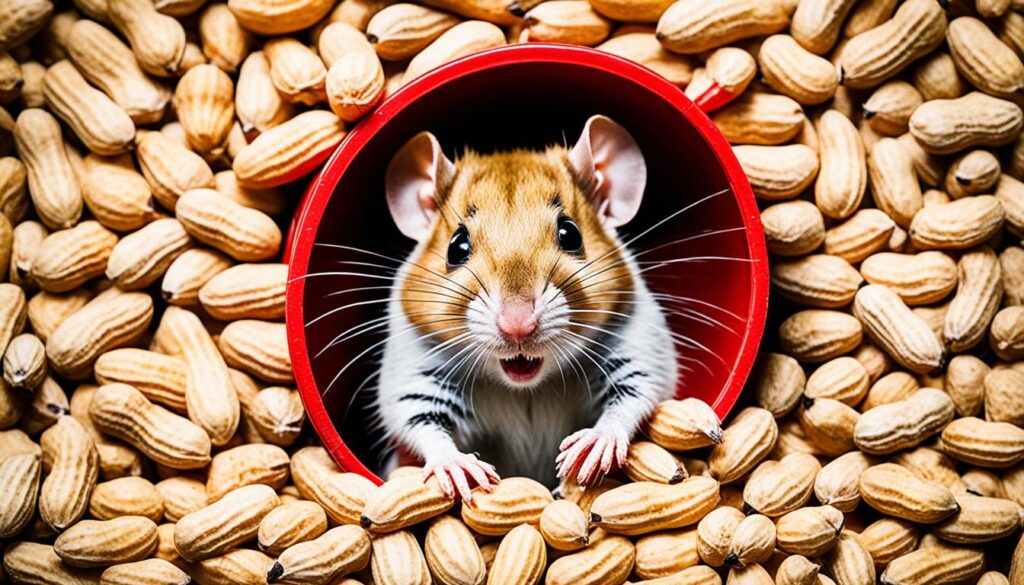
Fun Food Experiences for Rats
Rats are intelligent creatures that benefit from mental stimulation and enrichment. Making their food experience more fun can enhance their overall well-being. We have some creative ideas to add excitement to your rat’s mealtime and keep them entertained:
- Hide treats or pellets in paper cups or toilet paper tubes. This encourages your rat to use their natural foraging instincts to find food.
- Scatter treats around the cage instead of using a typical food bowl. This creates a scavenger hunt experience and encourages physical activity.
- Introduce interactive toys that require problem-solving to obtain treats. Puzzle feeders or treat balls are excellent options to engage their minds.
- Chewing on safe materials like cardboard, coconut shells, or soft wood can provide additional enrichment for rats. It helps keep their teeth healthy and satisfies their natural chewing instincts.
By incorporating these fun food experiences into your rat’s daily routine, you can keep them mentally stimulated, physically active, and satisfied.
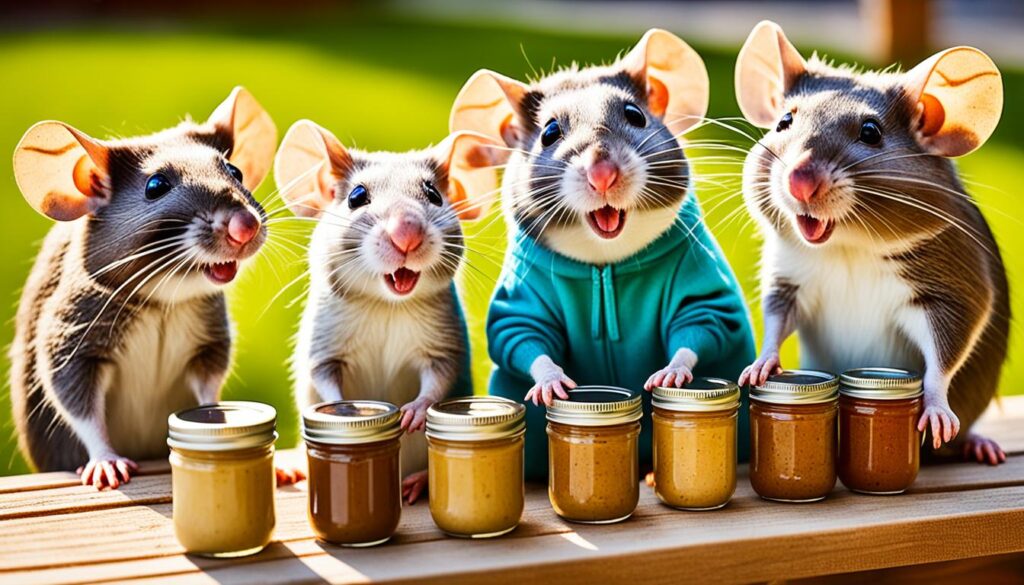
Creating a Rat-Friendly Food Puzzle
“Food puzzles can be a great way to challenge and engage your rat. It combines food foraging with mental stimulation, keeping them mentally sharp and entertained.” – Dr. Jane Barnes, Small Animal Veterinarian
To create a simple food puzzle for your rat, follow these steps:
- Take a cardboard box and cut small holes in various sides.
- Place some of your rat’s favorite treats inside the box.
- Close the box and watch as your rat investigates and figures out how to access the treats through the holes.
Remember to supervise your rat while they interact with the puzzle and ensure that the materials used are safe and free from any potentially harmful substances.
Recommended Rat-Safe Toys for Enrichment
| Toy | Description |
|---|---|
| Lava Ledge | A natural lava rock ledge that rats can climb and chew on. |
| Snak Shak | A hideout made from chewable, edible materials like alfalfa and honey. Provides a cozy spot and a tasty snack. |
| Hanging Treat Maze | A toy that suspends treats within a maze. Rats must navigate the maze to access the treats. |
| Hamster Wheel | While designed for hamsters, a solid-surface wheel can offer exercise and a playful outlet for rats. |
These toys can add an extra layer of mental and physical stimulation to your rat’s environment. Make sure to choose toys appropriate for your rat’s size and supervise their interactions to ensure safety.
Preventing Obesity in Rats
Rats, like humans, can be prone to obesity, which can lead to various health problems. As responsible rat owners, it is our duty to ensure that our furry friends maintain a healthy weight. To prevent obesity in rats, we need to provide them with opportunities for exercise and mental stimulation.
One way to promote physical activity is by incorporating food puzzles or toys into their environment. These interactive toys engage their natural foraging instincts, encouraging them to move and search for their food. Additionally, providing rats with multi-level cages allows them to explore and climb, providing them with physical exercise and entertainment.
Supervised playtime outside of the cage is also essential for rats’ well-being. Creating a safe and secure area where they can roam, climb, and explore can help keep them active and prevent weight gain. However, always ensure that the play area is free from potential hazards and closely monitor their activities to ensure their safety.
Controlling portion sizes is another crucial aspect of preventing obesity in rats. It’s important to provide them with a balanced diet that meets their nutritional needs without overfeeding. Remember, rats have small stomachs, so it’s best to offer them several small meals throughout the day rather than one large meal. Monitoring their food intake and adjusting portion sizes accordingly can help maintain a healthy weight.
In addition to portion control, it’s essential to be mindful of the treats we give our rats. While treats can be a great way to bond with our furry friends, it’s important to choose treats that are low in carbohydrates and sugar. Opt for healthier options such as fresh fruits and vegetables, or commercially available rat treats that are specially formulated to meet their nutritional needs.
| Tips for Preventing Obesity in Rats: |
|---|
| Create a stimulating environment: |
| – Incorporate food puzzles or toys |
| – Provide multi-level cages for exploration |
| – Allow supervised playtime outside of the cage |
| Control portion sizes: |
| – Offer several small meals throughout the day |
| Choose healthy treats: |
| – Opt for low-carbohydrate and low-sugar options |
By following these preventive measures, we can ensure that our rats maintain a healthy weight and live a happy, active life. Remember, regular veterinary check-ups are also important to monitor their overall health and well-being. Let’s be proactive in preventing obesity in our beloved pet rats!

Staying Mindful of Rat’s Dietary Needs
When caring for our pet rats, it is crucial to prioritize their dietary needs. Rats require a balanced and nutritious diet to ensure their overall health and well-being. We need to provide them with a diverse range of fresh fruits, vegetables, lean proteins, whole grains, and small amounts of dairy products.
Commercially available rat blocks and treats can also be incorporated into their diet to offer additional nutrients. These specially formulated products are designed to meet the specific dietary requirements of rats, providing them with essential vitamins, minerals, and proteins.
However, it is important to remember that moderation is key. Following recommended serving sizes and avoiding overindulgence in unhealthy foods is crucial for maintaining their optimal health. Overfeeding or offering large quantities of treats can lead to obesity, which can pose serious health risks.
Recommended Rat Diet
Here is a breakdown of the essential components of a rat’s diet:
- Fresh Fruits: Offer a variety of fruits such as apples, bananas, and berries. They are a great source of vitamins and antioxidants.
- Vegetables: Include leafy greens like cabbage and broccoli, as well as carrots and peas for additional fiber and nutrients.
- Lean Proteins: Incorporate lean proteins like cooked chicken or turkey, boiled eggs, and tofu to support their muscle development.
- Whole Grains: Provide whole grains like brown rice and oats, which offer complex carbohydrates for sustained energy.
- Dairy Products: Offer small amounts of low-fat yogurt or cheese as a calcium source for strong bones and teeth.
By following these guidelines and offering a variety of foods, we can ensure that our pet rats receive a well-rounded and nutritious diet.
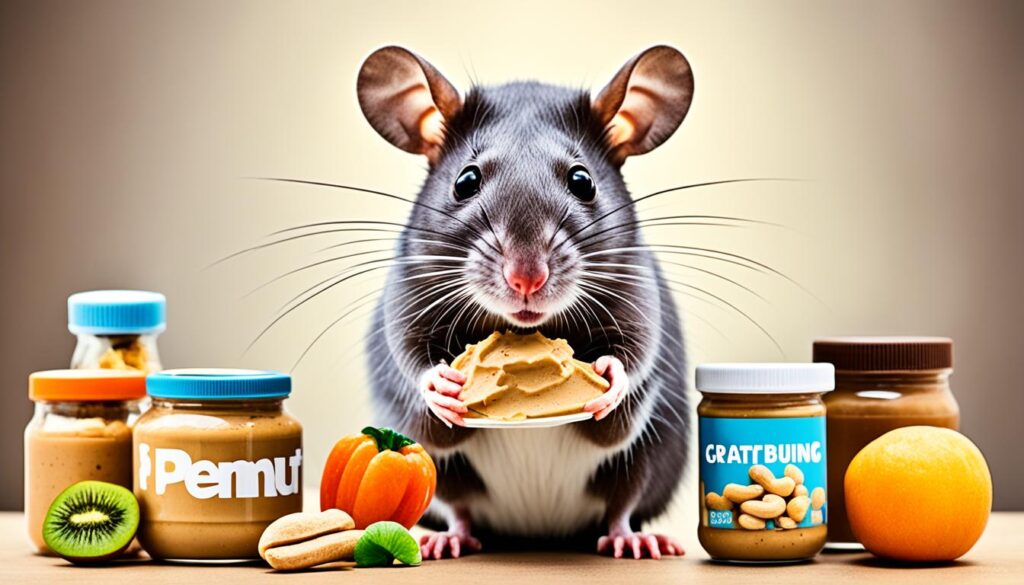
“Caring for our rats’ dietary needs is essential for their overall health and well-being. Providing a balanced diet with fresh fruits, vegetables, lean proteins, whole grains, and minimal dairy products helps them thrive.”
Conclusion
In conclusion, rats can safely enjoy peanut butter as a treat, but it is important to exercise caution in its presentation to avoid any choking hazards. While rats have a diverse food repertoire, it is crucial to be aware of potential toxins and harmful foods. Limiting the consumption of unhealthy foods and minimizing physical risks is essential for their well-being.
Providing rat-safe alternatives, such as fresh fruits, vegetables, lean proteins, and specially formulated rat blocks and treats, ensures a balanced and nutritious diet. By staying mindful of their dietary needs and taking preventive measures against obesity, we can help rats lead healthy and fulfilling lives.
Remember, incorporating a variety of rat-friendly foods and promoting mental stimulation through interactive food experiences can enhance their overall health and happiness. With proper care and attention to their dietary requirements, rats can thrive as cherished pets and continue to bring joy to our lives.
